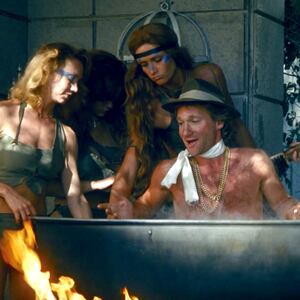On Friday night, Bill Maher welcomed an unlikely guest to Real Time: B.J. Novak, the Office writer/co-star, bestselling author, and filmmaker.
Novak visited the HBO program to promote his feature directorial debut Vengeance, an indie screwball about an opportunistic New York City journalist/podcaster who ventures to red-state Texas to investigate the death of a former flame. So naturally, Maher tried to engage Novak on a number of hot-button cultural issues regarding the political divide in this country.
Maher kicked things off by asking Novak about “the cognitive dissonance of, I don’t agree with you politically, but I like you personally… how can we do that on a national level en masse?”
“In my opinion, it’s about emotion more than argument, and I think it’s about stopping ourselves from picking at the scab of everything that we disagree on,” Novak calmly explained. “Twitter is a drug for that, and when we’re separate behind screens, we pick the scab, we bite the canker sore of the things we disagree on. And I think if we all try to do that less, and focus on things like comedy, or sports, or art, or whatever, or sitting down over dinner, I think that is a start.”
The audience gave Novak a round of applause, which made Maher awkwardly smirk.
Then, Maher waded into so-called “cancel culture,” which in this case encompassed the notion that Twitter-happy audience members are somehow censoring Hollywood productions and not vice versa.
“Lately we’ve been talking a lot about on this show—we’re gonna talk about it tonight—the freedom in the arts,” offered Maher, before continuing: “You know, you’ve written some episodes of… The Office which they don’t show now. I see Jamie Foxx’s new movie was shelved—I guess he made it a few years ago, but they’re not gonna ever show it. They make less comedies. I mean, you found a way to make a comedy about something, but I’m sure you have to be very careful about a lot of different things. They’re making less because it’s so not worth it to even try. Where are you on that?”
Novak wasn’t so convinced of Maher’s theory. “I think there’s a difference between the gatekeepers and the audience—and I think you see this firsthand as a stand-up. The audiences, I think, are pretty down for everything,” he said. “They’re pretty smart people, and can be trusted a lot more than the gatekeepers sometimes worry. The gatekeepers are worried about the chatter in their own spheres, but I think audiences can be trusted to be pretty smart.”
“But it’s not in the hands of the audience,” shot back Maher.
“That’s what I’m saying,” replied Novak. “I’m saying, I don’t think the problem is that the audiences are too sensitive. I think the problem is that people are worried that other people are too sensitive.”
Maher was speechless.
The Office episode controversy Maher mentioned could use a bit of context. He was referring to an episode of The Office, “Diversity Day,” that Comedy Central decided to omit from an Office marathon on its network. The episode is still available on streaming services and for purchase, so this was clearly a decision made by the gatekeepers and not the audience, as Novak contended.
As for Jamie Foxx’s feature directorial debut All-Star Weekend, which the actor has claimed was shelved indefinitely due to sensitivities over Robert Downey Jr. playing a Mexican in the film, well, the movie was shot all the way back in 2016, and apparently featured Foxx playing a white racist cop and Downey Jr. as a Mexican. The movie was originally scheduled to be released in Feb. 2018, timed to NBA All-Star weekend, but was not completed in time. Its release date was then pushed a year to NBA All-Star weekend 2019 but was still not completed in time. All-Star Weekend’s release was subsequently pushed to late 2019, and then to 2021, but is now apparently on ice. We don’t know whether this has to do with the quality of the film or other factors, but rest assured, it’s the studio’s decision.
An important piece of info that Maher rather conveniently failed to mention regarding All-Star Weekend is that, in addition to its apparent post-production problems, Jeremy Piven has second billing in the film. In late 2017 into early 2018, eight women accused Piven of sexual misconduct.






